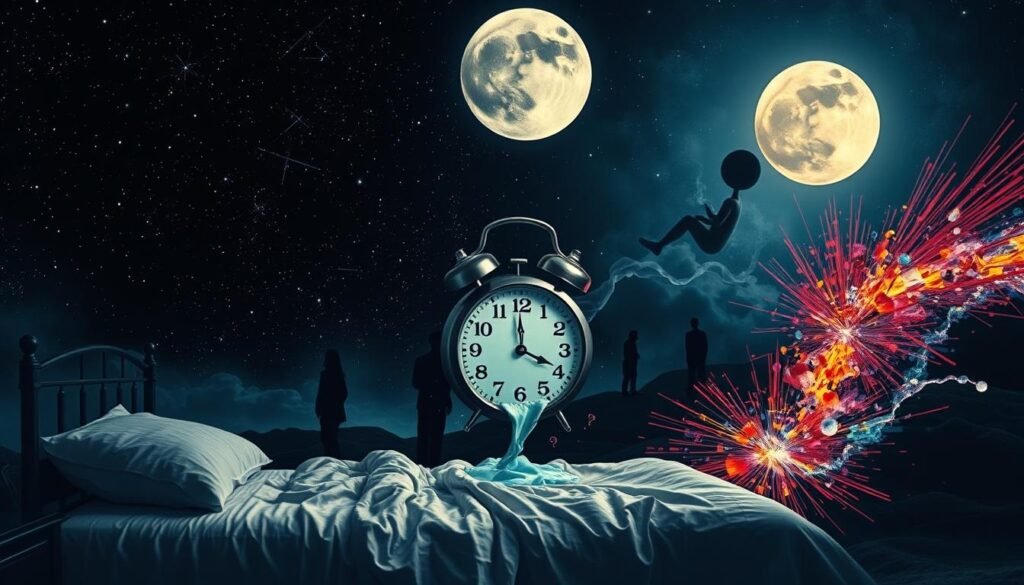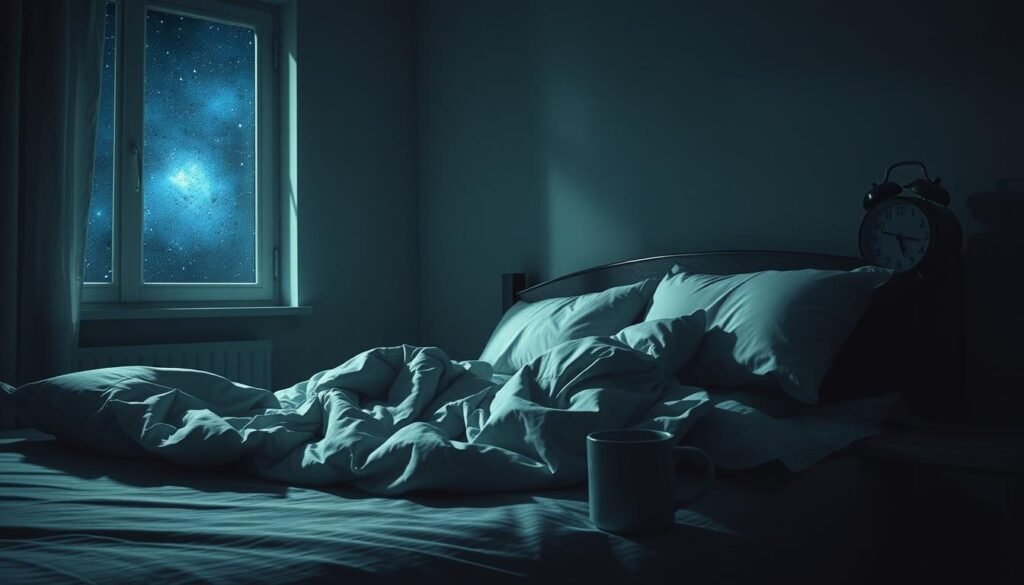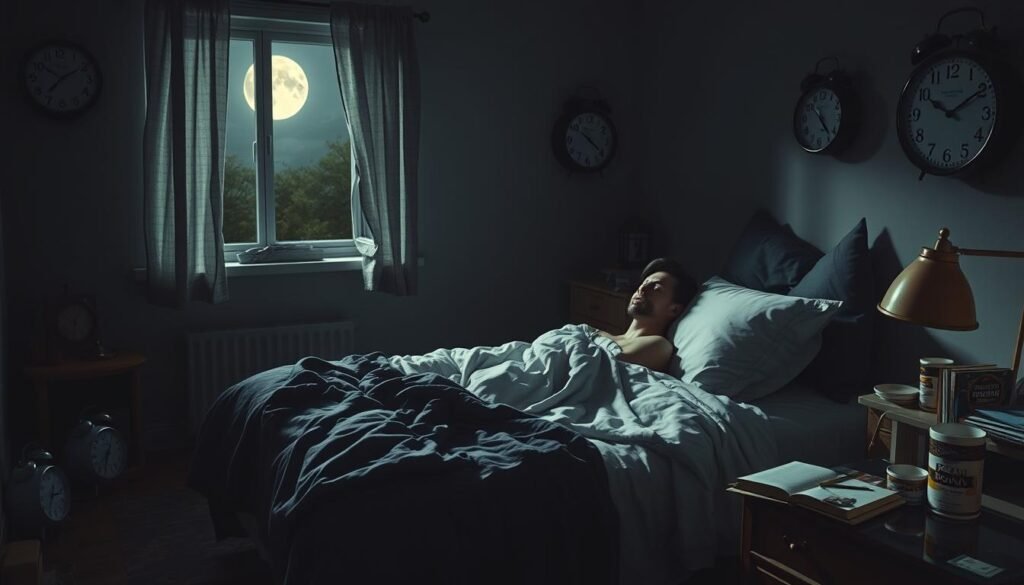Did you know nearly one in three adults face sleep insomnia at some point? This fact shows how crucial it is to know the different kinds of insomnia. By understanding types like short-term and chronic insomnia, you can better tackle sleep problems. This article will help you learn about insomnia’s complexities, leading to smarter discussions and better treatments. For deeper insights on these types, visit this resource.
Key Takeaways
- Insomnia affects nearly one in three adults, emphasizing its widespread nature.
- Understanding the different types of insomnia is crucial for effective treatment.
- Short-term insomnia can stem from stress or anxiety.
- Chronic insomnia may lead to serious health complications if untreated.
- Personalized treatment plans can help manage sleep challenges effectively.
- It’s essential to differentiate between insomnia subtypes for targeted therapies.
Understanding Insomnia and its Impact on Health
Insomnia is a common sleep issue, making it hard to fall asleep or stay asleep. It can lead to significant health impacts, affecting how you function each day. People with insomnia might face memory and concentration problems. If not addressed, insomnia may raise the risk of diseases like heart issues and diabetes.
The link between good sleep and well-being is strong. Getting enough sleep is key for physical health, emotion control, and thinking clearly. Not sleeping well can lead to feelings of anxiety and depression. For more details on sleep and health, check out reliable health resources.
It’s important to understand insomnia’s effects to tackle this issue. Treating insomnia helps improve life and reduce health risks in the future. If you’re struggling with sleep, getting help and finding treatments is crucial.
To handle insomnia, making changes in your lifestyle helps. Good sleep habits can really improve sleep quality. Talking to mental health experts can also help deal with sleep problems’ root causes.
| Health Impact | Description |
|---|---|
| Cognitive Decline | Struggle with focus, memory, or concentration, affecting daily activities. |
| Chronic Illness Risk | Increased chance of diseases like heart issues, obesity, and diabetes. |
| Emotional Disturbances | More likely to experience anxiety, depression, and mood swings. |
In conclusion, recognizing insomnia and its effects on health is crucial. It promotes awareness and helps people seek treatment for sleep issues.
Types of Insomnia
Different types of insomnia can really impact how well someone does during the day. Knowing about these kinds can help find the right treatments. Here’s a quick look at the main types: short-term insomnia, chronic insomnia, and transient insomnia.
Short-Term Insomnia
Short-term insomnia doesn’t last longer than three months. It’s usually caused by stress or big changes in life. Things like switching jobs or dealing with a loss can make it hard to sleep. If you’re dealing with this, trying out relaxation methods and a soothing nighttime routine might help.
Chronic Insomnia
Having trouble sleeping at least three nights a week for more than three months is known as chronic insomnia. It often goes hand in hand with health problems or certain lifestyle habits. Treating it usually involves therapy, medicine, and changing some habits.
Transient Insomnia
Transient insomnia is when you can’t sleep well now and then. It’s often because of short-term changes, like traveling or a new environment. Usually, it gets better once you get used to the change. Knowing why it happens can help you handle these short sleepless periods better.

Exploring more about types of insomnia and how they impact life can make you more aware and better at dealing with them.
Categorizing Insomnia by Duration
It’s key to know how insomnia is sorted by how long it lasts. Acute insomnia is short and has clear causes. It comes from things like stress or changes in your environment that mess up your sleep.
Acute Insomnia
Acute insomnia doesn’t last more than a month. It happens because of specific things. These can be stress from an exam, work pressure, or big changes in life.
- Common triggers include:
- Job pressure
- Health concerns
- Emotional distress
- Symptoms may involve:
- Difficulties falling asleep
- Frequent awakenings
- Daytime fatigue
Studies show that tackling acute insomnia early can really help. People get better by learning to relax, improving sleep habits, and trying therapy made for insomnia.
| Aspect | Acute Insomnia |
|---|---|
| Duration | Less than 1 month |
| Causes | Stress, environmental factors |
| Symptoms | Difficulties falling asleep, daytime fatigue |
| Treatment | Relaxation techniques, CBT-I |
Dealing with acute insomnia quickly can stop it from getting worse. Knowing its signs and what causes it is the first step towards better sleep.
Exploring Sleep Onset Insomnia
Sleep onset insomnia is hard for some people when it’s time to sleep at night. It leads to difficulty falling asleep, which affects how well they sleep and function during the day. Main causes include anxiety, stress, and things like noise that disturb peace.
Choices we make can also make things worse. Not sticking to a regular sleep time and too much screen time before bed are bad habits. To fix sleep onset insomnia, making your bedtime routine healthier is key. This includes making sure your sleeping area is quiet and dark to help you relax.
Sticking to a good sleep routine and relaxing before bed can make falling asleep easier. For more info on insomnia and ways to deal with it, click here.
| Factor | Impact on Sleep Onset Insomnia |
|---|---|
| Anxiety | Heightens worry, making it hard to relax |
| Stress | Can lead to racing thoughts, delaying sleep |
| Environmental Factors | Noise and light disturbances hinder relaxation |
| Poor Sleep Hygiene | Irregular sleep schedules disrupt natural rhythms |
Delving into Sleep Maintenance Insomnia
Sleep maintenance insomnia makes it hard for people to stay asleep or they wake up too early. This insomnia type leads to insomnia symptoms that disrupt daily activities. Many factors cause this issue, leading to tiredness and sleepless nights.
Symptoms of Sleep Maintenance Insomnia
The symptoms of this insomnia type disturb one’s life greatly. Here are some common signs:
- Persistent difficulty staying asleep throughout the night
- Waking up often
- Feeling tired during the day
- Having mood swings
- Problems focusing and remembering
The Sleep Research Society found reasons why sleep gets interrupted. People often fall into a cycle where insomnia symptoms worsen, making good sleep hard to get.

Noticing these signs is crucial in dealing with sleep maintenance insomnia. Getting help from doctors is a wise step. It helps people improve their sleep and overall life quality.
Comorbid Insomnia: Understanding the Connection
Comorbid insomnia is a sleep disorder that comes with other health problems. This condition makes treating both insomnia and health issues more complex. It’s key to grasp this to manage it well.
Common Conditions Associated with Comorbid Insomnia
Studies show comorbid insomnia often goes hand in hand with several health issues. Depression, anxiety, and chronic pain stand out as top links.
- Depression: Many who are depressed find it hard to fall or stay asleep.
- Anxiety: Anxiety can wreak havoc on sleep, leading to ongoing insomnia.
- Chronic Pain: Issues like arthritis or fibromyalgia worsen sleep troubles, causing comorbid insomnia.
Knowing these ties helps in crafting better treatment plans. Approaches that tackle both insomnia and the health issues can boost patient recovery.
Psychophysiological Insomnia: The Mind-Body Link
Psychophysiological insomnia is where mind and body clash. Stress and anxiety cause physical symptoms, making good sleep hard to get. This problem starts a vicious circle. Worries about sleeping lead to more anxiety and less sleep.
To tackle this, understanding the mind-body connection is key. Mental stress turns into physical tension, messing up sleep. Focusing too much on sleep troubles makes anxiety worse. This creates a loop of worry and bad sleep.
Cognitive-behavioral therapy (CBT) helps break this loop. CBT changes negative thoughts into positive ones. Doing so reduces sleep-related anxiety and leads to better sleep.
Relaxation methods like mindfulness meditation, deep breathing, and muscle relaxation improve the mind-body connection. They lower stress and help with sleep. This boosts overall well-being.
Conclusion
Understanding different types of insomnia is key for managing it well. We talked about short-term, chronic, and transient insomnia. Knowing about these helps figure out the best way to treat them.
If you have insomnia, getting help from a doctor is a good step. They can suggest many treatments, like therapy or medication. This helps you sleep better and improves your life.
Knowing about insomnia helps you sleep better. Recognizing the different types can help you find ways to get restful sleep. This leads to better days.